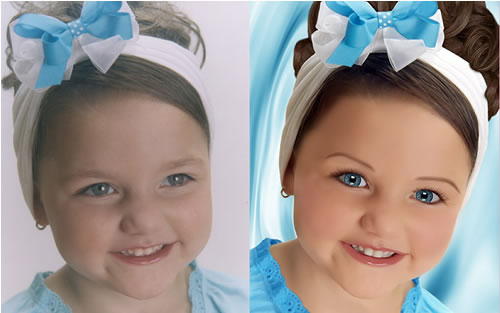
The above picture comes from a website that offers pageant photo retouching. Creepy, huh? It came up during a Google search after I read this article in Newsweek about the rising trend among parents to have their children's grade school pics retouched, as early as the second grade.
The article asks to what degree does this retouching fuel self-esteem problems and unrealistic body expectations. Among those that it quotes are Danielle Stephens, a production manager for Prestige Portraits, which has studios in nearly every state, who says, "I have a 12-year-old, and I'd be afraid that if I asked for retouching she'd think she wasn't good enough." It also quotes Kelly Price, a photographer at Legacy Photo, an agency outside Philadelphia, who explains, "People want their kids to look perfect rather than teach them to appreciate their flaws." The article also interviews Cornell University historian Joan Jacobs Brumberg, author of The Body Project, which looks at the diaries of teenage girls from the 1820s through the 1980s. She explains that this trend [digitally cleaning up and perfecting faces and figures] creates "a culture of kids who are being socialized to unrealistic images" and that "girls internalize this form of self-criticism and say, 'I don't look like that.' But in reality nobody looks like that."
Of course, I completely agree with those interviewed, especially Brumberg. In addition to the above points, where do these retouchers get the standards that govern a "perfect" picture? That, to me, seems to be part of the problem.
For yet another take on this, there's an editorial in Salon.com.
But what do parents have to say? After a little poking around, I found a parenting blog where a few parents had commented on the article. Here are two of their responses:
1) Parents aren't asking that their kids be completely photoshopped. They are just asking for the monster pimple to be reduced to a red dot.
2) The first year of my son's life he had awful exzema. We finally found things that worked and cleared it up, but a year ago I was looking at his first year pictures, and it was hard to get past the rashes. So I went in and photo shopped his skin. They aren't all perfect, but they're so much better, and now you can focus on the whole picture, and not just the rash on his face, neck, and arms.
I don't see that there's anything wrong with this. Just like when I go back and take out a few zits from my face!
These responses raise several questions for me. In addition to proving Brumberg's point, they make me wonder about the kind of daily history that gets created when these kinds of small details are erased. What kind of memories will these children have of themselves, their families, and their surroundings as told by these visual images? In addition to constructing unrealistic assumptions about their bodies, what about the larger implications? What about these visual signifiers (pimples, bad haircuts, toothy smiles) as signifiers of certain times in one's life? What kind of effect might this have on how these children remember their childhoods?
Comments
Look-a-like
This reminds me of those services that will make a doll that looks just like your child, except in this case parents can make their kid look just like a doll.
Wow...this picture is
Wow...this picture is extremely creeptacular. In two senses: it's a really creepy picture, and I have to say (at the risk of sounding like a jerk) that it takes a creep to look at the picture on the left and think "Not good enough!" This trend is so disturbing for so many reasons. (This particular example is disturbing because of the swirling blue vortex and the cold, inhuman eyes this child has been given. Stop looking at me, zombie baby!) It's one thing to erase an outrageous zit; but I don't think that can be conflated with this, and it's another thing altogether to completely revise your daughter's face in line with some outrageous standard of...what? This seems far from perfection to me.
This easily seems totally indefensible to me, in my opinionated judgmentality.
Well said...
Especially zombie baby.
I would like to point out that we can avoid this problem with girls internalizing photoshopped(faked) body images seen in magazines etc by simply teaching all children about photoshop and for (what the most part) the whole celebrity/hollywood community is about.